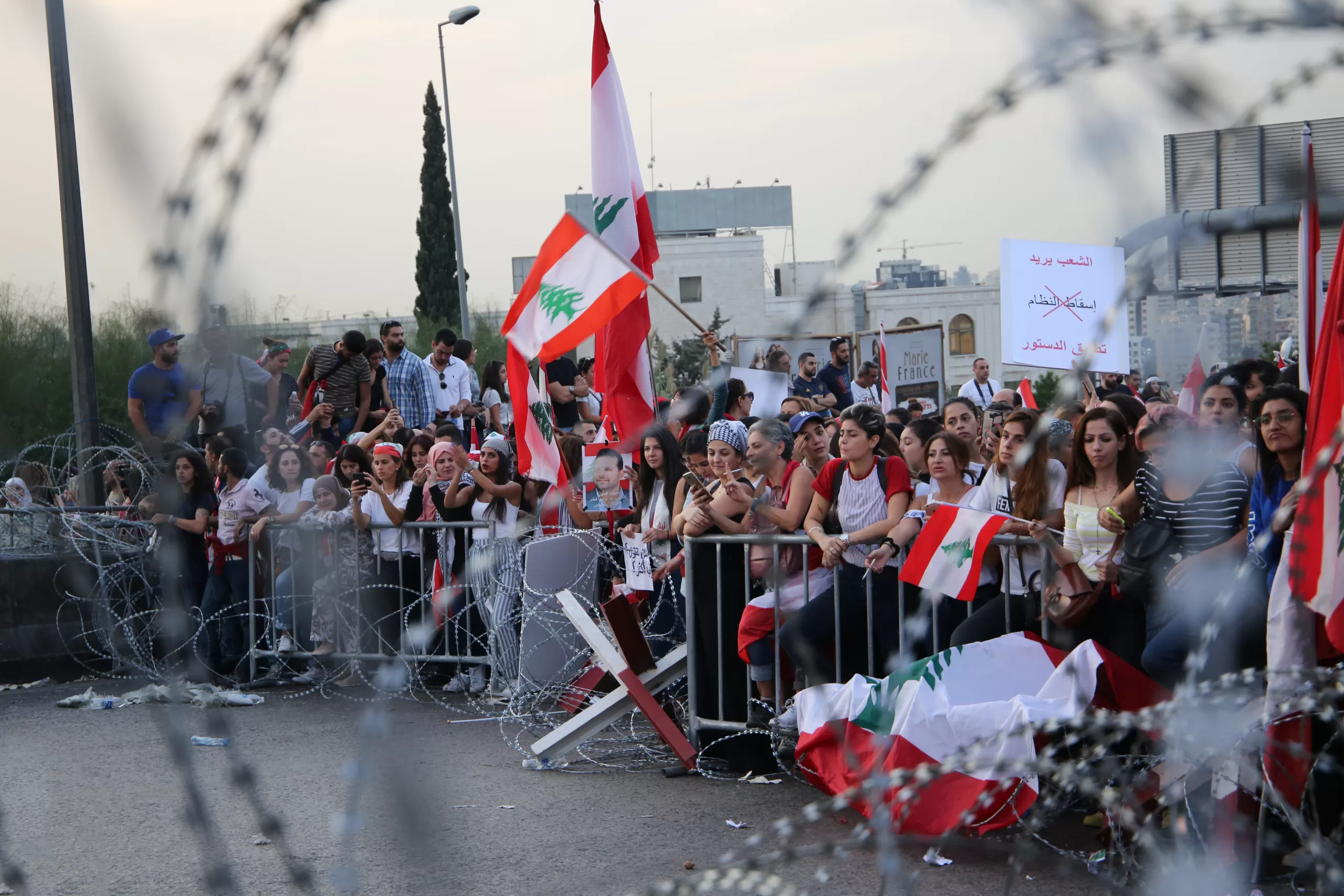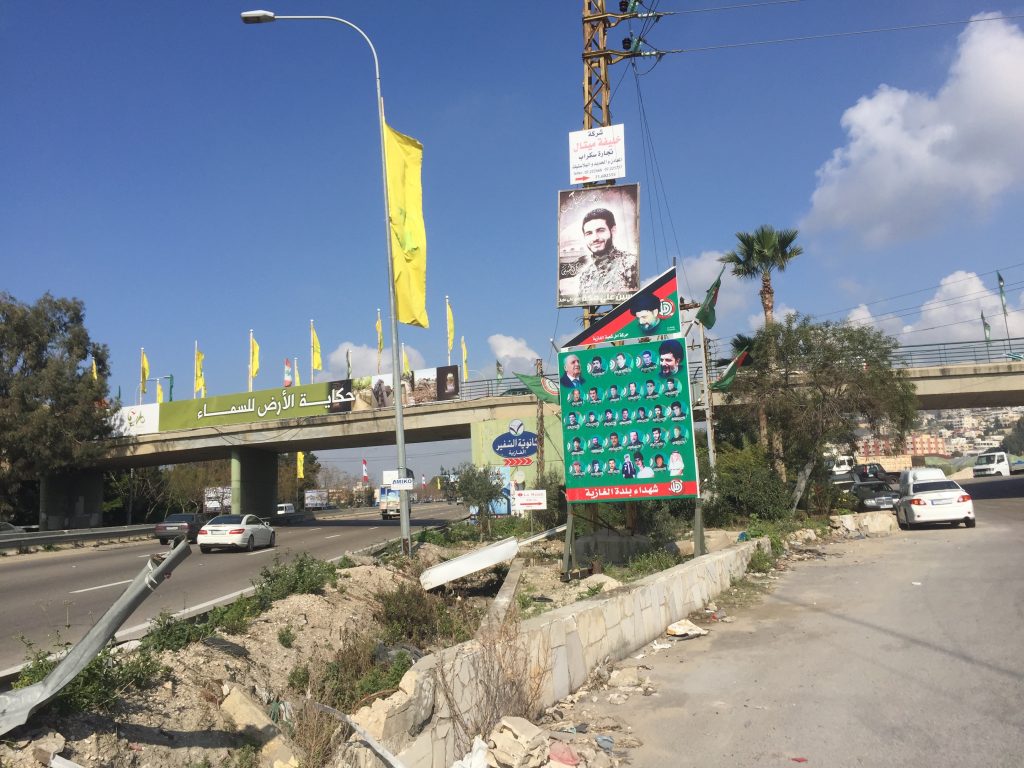Nils Mallock is a postdoctoral researcher with the Cross-Border Conflict Evidence, Policy and Trends (XCEPT) research programme at King’s College London (KCL). Here, he tells us about his experience researching the psychological causes of violent and high-risk political action, touching on his previous work in Iraq and Lebanon.
Hi Nils. Please could you introduce yourself and your role on the XCEPT project?
I’m Nils Mallock, a postdoctoral researcher for the XCEPT team at KCL. My research focus has mostly been in political violence and extremism, and how this differs from more moderate forms of collective action, such as activism and peaceful political protest. Specifically, I have looked at the psychological causes underlying political behaviour, asking what motivates people to engage in, or disengage from, different forms of political action in different contexts.
Within the XCEPT project, I am working on our large longitudinal survey, called the Impact of Trauma Survey (IoTS), in Lebanon and Iraq. The IoTS is exploring the psychological impact of conflict exposure on things like mental health, trauma, and people’s perceptions of their social environment, and how these factors then in turn shape a person’s political beliefs and behaviours. As well as this, I’m jointly responsible for leading a multifaceted intervention study that we’re planning in Iraq, where we will test psychological interventions that could encourage reconciliation between groups in a post-conflict context.
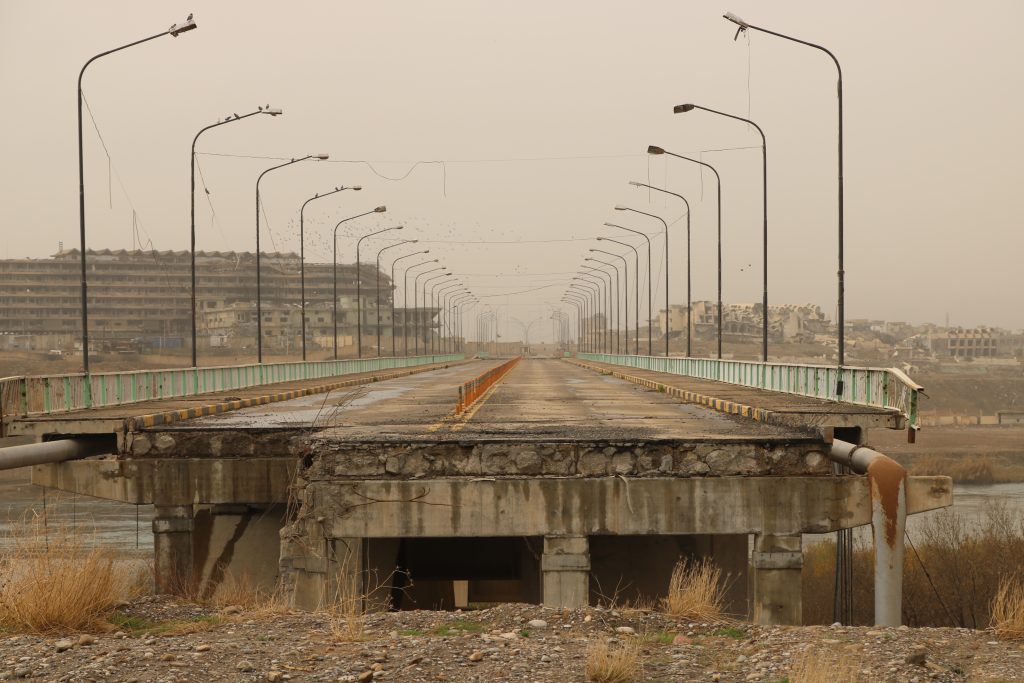
The Al-Shohada Bridge in Mosul, Iraq, which was destroyed during ISIS’ occupation of the city. Credit: Nils Mallock
Can you tell us a bit about your background and what you were doing before you joined XCEPT? What are your research interests?
After finishing my undergraduate studies in Germany, I moved to Lebanon to work as a researcher for the Konrad Adenauer Foundation’s Syria/Iraq office, as I was learning Arabic and interested in the dynamic politics of the Middle East. Seeing the effects of conflict first-hand made me want to understand how these conflicts emerge and what drives people to participate in them. I realised that everyone talks about political conflicts at a very structural and abstract level, looking at group dynamics, demographic changes, and social movements, but that this does not really explain why, among people in the same environment, some people embrace political violence, others embrace activism, and the vast majority do not even engage at all. There are clearly individual factors at play, but we don’t understand them robustly, especially in harder-to-access places, such as in conflict-affected regions, where insights are probably most valuable.
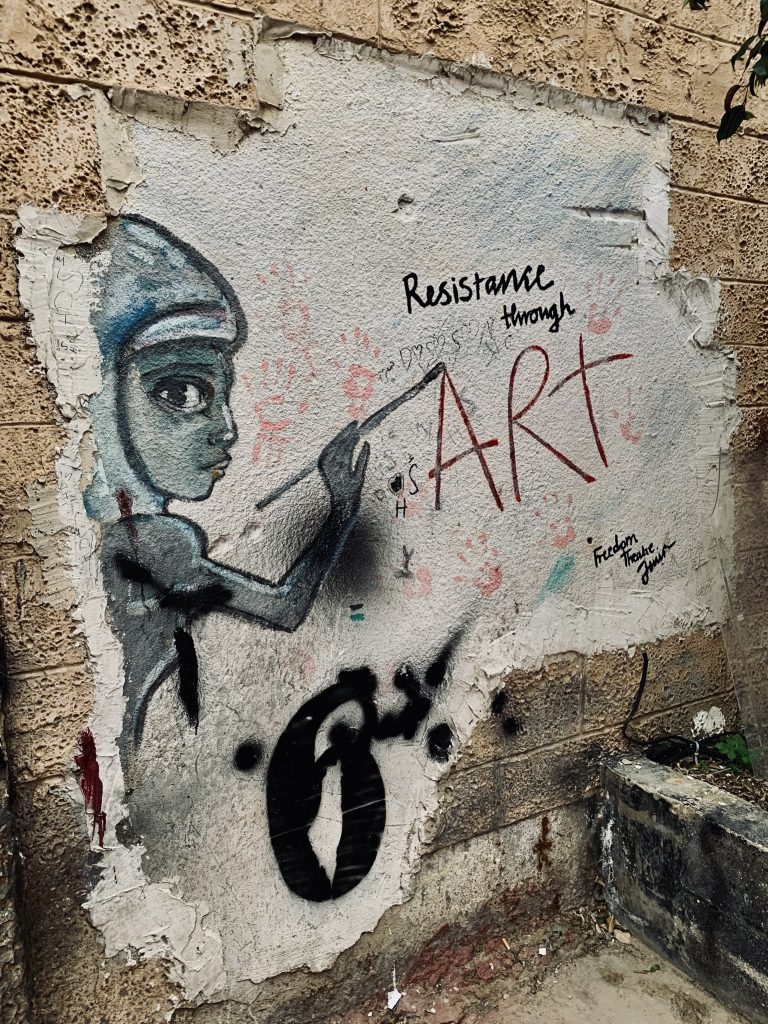
A display of art-based cultural and political action in Jenin Refugee Camp, West Bank. Credit: Nils Mallock
This interest led me to my PhD with the London School of Economics and Political Science (LSE), which examines the psychological motivations for violent versus peaceful political action in what I call ‘high-stakes’ environments. This can mean conflict-affected contexts, but also could be in countries with authoritarian governance. These high-stakes environments make it drastically more risky or costly for individuals to take even peaceful political action. I’m interested in what causes people to overcome these (seemingly) rational barriers and engage, especially for more radical and extreme political actions. This means asking: what psychological motivations are strong enough for people to ignore these costs and risks?
My PhD investigates this through quantitative studies in Iraq, Syria, Lebanon, Israel, and the Palestinian Territories, supplemented by interviews with activists and members of armed groups. For example, one study examined the effect of geographical proximity to Israeli settlements in the West Bank on different forms of protest behaviour. This study found that the mere presence of these settlements caused a shift towards participation in higher-risk action and away from lower-risk forms of protest.1
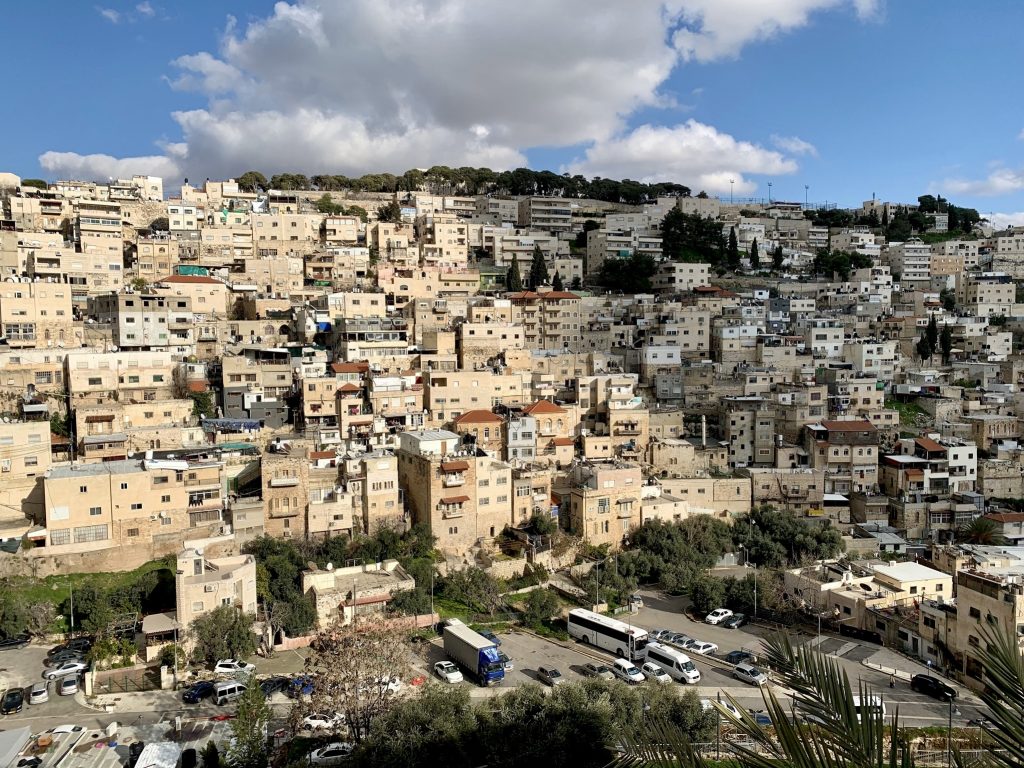
Silwan district in East Jerusalem. The predominantly Palestinian community is the site of intense land disputes, forced evictions and construction of Israeli settlements. Credit: Nils Mallock
You’ve combined some of your PhD research into your work with XCEPT. Could you tell us about your upcoming article on this?
I’m currently working on an XCEPT article, joint with my PhD at LSE, in which we report a series of experimental studies that I conducted in collaboration with civil society organisations and universities across seven locations in Iraq. These explored the role of uncertainty on political radicalism and activism. Previous studies have shown that, when someone’s sense of self is threatened, this creates feelings of uncertainty which often leads the person to act defensively. Interestingly, this defensiveness can manifest in expressing stronger opinions and extreme views about things that are completely unrelated.
For instance, if I lose my job, and that is central to my identity, I may try to compensate for that by expressing more extreme political opinions on controversial issues like abortion rights or discrimination against other groups, because this provides a feeling of certainty about my world view and restores a sense of unique identity. However, it wasn’t known at the time whether this mechanism extended also to intentions to actually act on those political beliefs. On top of that, we didn’t know whether this applied in conflict-affected settings, where uncertainty is generally higher.
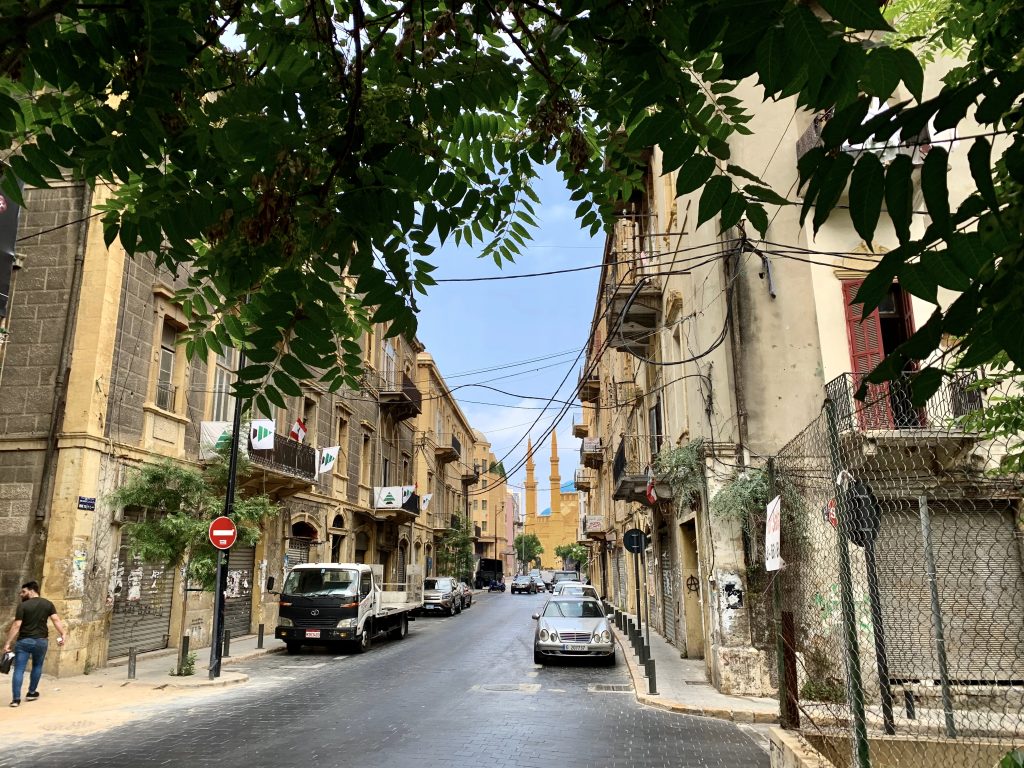
View onto Mohammad Al-Amin Mosque in Beirut, Lebanon. Credit: Nils Mallock
In our studies, participants were exposed to feelings of uncertainty, through an exercise in which they reflected on their own mortality. Their intentions to take different kinds of political action were then measured. What we found is that the people exposed to feelings of uncertainty were more willing to engage in political action, and especially in radical actions compared to more moderate activism. However, this was not the case when the participants were given another opportunity to restore their self-certainty – by reflecting on and writing a short text about something particularly meaningful to them – before measuring their intentions. Interestingly, we found some evidence that those measuring higher in emotional stability were in general not responding to those mechanisms. These findings could give some initial insights to help design targeted psychological interventions to support social reconstruction efforts in conflict-affected regions.
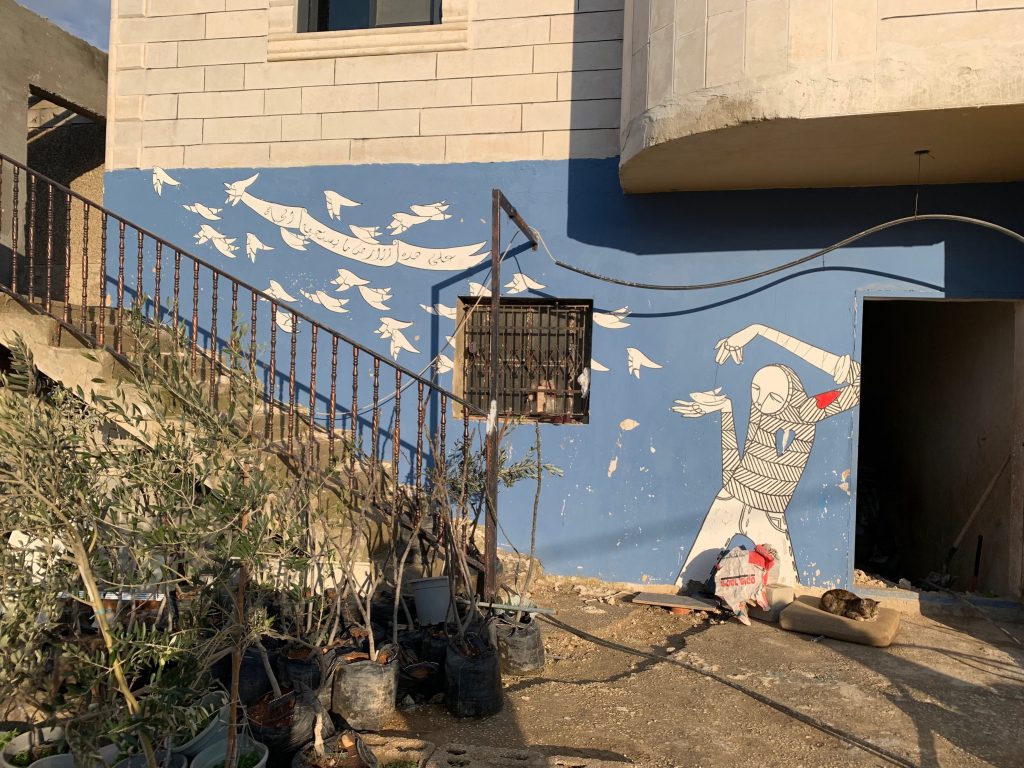
Street advocacy by Palestinian activists in South Hebron Hills, West Bank. Credit: Nils Mallock
And now with XCEPT, one of your main responsibilities will be the implementation of an intervention study in Iraq. Could you give us some more information about the study?
My colleagues and I on the XCEPT project are going to conduct a comprehensive study in Iraq to understand causal mechanisms of intergroup conflict and, as importantly, pathways for reconciliation and peacebuilding between former or current conflict groups. Intervention studies have already been done in other complex settings, such as in the Israel-Palestinian conflict, but this kind of research is actually rare in Iraq. This is partly because it’s harder to access as a research population, especially with surveys of this scale.
What we will do is test several psychological interventions promoting reconciliation between groups, working with local partners and civil society organisations. For example, one intervention will aim to counter false perceptions of the outgroup as being ‘fixed’ and inherently incapable of change, which can be an obstacle for successful reconciliation. Then we will compare the different interventions in what’s called a ‘tournament’ study design, where the most successful intervention from this stage will be taken forward with participants from all over Iraq, including many of those taking part in our IoTS.
Banners in South Lebanon displaying members of political parties and militias. Credit: Nils Mallock
This will allow us to look at how different characteristics identified in our IoTS, such as mental health or personality traits, influence responses to the intervention. We will also target these interventions to their specific context within Iraq by working with local experts and advisors to make sure the materials are relevant to the different groups, and this will be interesting because it’s quite novel to do this kind of work.
What are you hoping will come out of this intervention study?
The intervention study will be highly innovative research pushing into new territory. This is because it is being run in Iraq, which is rare, and because it will directly compare multiple interventions on a large-scale with a highly diverse sample. The overall goal is to identify causal mechanisms of conflict reconciliation and the improvement of intergroup relations. The big benefit of this study is that it involves measuring the intentions of the participant before and after the intervention. This will help practitioners, who are signalling strong demand for insights into what efforts might be effective to build social cohesion in a post-conflict setting.
This Q&A was originally published on the ICSR website.
- Mallock, N. U., & Krekel, C. (2024, June 10). Proximity to settlements in the West Bank shifts protest behaviour towards higher-risk engagement and raises perceived relative deprivation. https://doi.org/10.31234/osf.io/9xkze ↩︎

